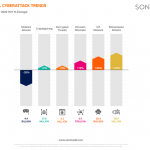Industry Talk
Regular Industry Development Updates, Opinions and Talking Points relating to Manufacturing, the Supply Chain and Logistics.Shippers: Don’t Forget Scope 3 Compliance in Your Peak Season Transportation Spend

With peak season already underway, shippers in every conceivable industry are working to execute their transportation spend strategies while, in all likelihood, making adjustments as needed to reflect how peak season is unfolding.
Trax is right in the middle of this every year, giving shippers (especially retailers) visibility to transportation spend data that provides insights and validation to earlier forecast assumptions.
While getting products to customers is number one priority, and doing as the best possible balance of cost and service, another aspect of transportation logistics is soon to add a third component to service and cost, and that is carbon emissions. Publicly traded companies have no choice but to include in their transportation spend strategy: They must be building the capacity to comply with the Securities and Exchange Commission’s Scope 3 mandates on greenhouse gas (GHG) emissions.
This is the third in a series of mandates that require publicly traded companies to report their GHG emissions. Companies must be compiling this information starting January 1, 2024, in order to report a full year in January 2025. And it’s by far the most difficult scope with which to comply.
Scope 1 emissions are those resulting directly from your own operations. Scope 2 are indirect GHG emissions associated with the purchase of electricity, steam, heat or cooling. Both of these rely on data that every company should have little trouble compiling because they have to do with the company’s own activity.
Scope 3 is a very different beast. According to the Environmental Protection Agency, Scope 3 emissions are the “result of activities from assets not owned or controlled by the reporting organization, but that the organization indirectly affects in its value chain.”
So if you’re doing business with Company Z, and that activity results in Company Z
- a) emitting an additional cubic ton of greenhouse gases; or
- b) purchasing an additional 100,000 BTUs of electricity, then Company Z (if it’s publicly traded) has to report that activity as part of Scope 1 and Scope 2. And your company has to report it as part of Scope 3.
There is no pushback on the timeline for this. The SEC will demand full data for activity starting on the first day of 2024. So what does this mean for shippers? Tracking carbon emissions for their third party logistics providers and carriers.
I can understand why a company already managing the demands of peak season would not welcome the additional burden of building up a mechanism for collecting data from their carriers and others in their supply chain. But a mandate is a mandate. And waiting until 2024 has already started, then trying to collect the data from other companies after the fact, would be a complete disaster. The time to do this is now.
So shippers, you’re left with two options. One is to build the system and infrastructure to do this yourself. That will require building calculation models for the data, engaging with all the carriers and other logistics service providers you utilize (or might utilize in the future) and calculating the emissions data from these various sources. Which is not a simple process. For example, accurate emissions data will require an understanding of different types of vehicles and types of fuel, as well as their weight and dimensions, and the distances they travel.
With the right people and the right resources, this is not impossible. But it will make an impact on your transportation spend, and there’s no time to wait.
The other option is to work with a third party that’s already set up to do this. At Trax, we anticipated that many of our customers would need help with tracking carbon emissions and fundamentally, the key data elements are already captured as part of the freight audit and pay process (carrier, mode, distance, and weight).
By the way, there is a bright side to the Scope 3 mandate. It is often the case that shippers can balance service, cost, and carbon emission reductions by having visibility to all three metrics. The same data shippers must provide to the SEC will give them a lot of useful insight into their own operations. The entire industry is looking for ways to be more sustainable, and the Scope 3 data on GHG emissions will prove to be a real eye-opener when it comes to any shipper’s environmental impact – both upstream and downstream.
As peak season progresses, shippers are already focused on planning, executing and optimizing the movement of goods. They’ve come to us for years looking for data that can help them improve their end-to-end supply chain logistics performance.
The data they need to comply with Scope 3 is just another piece of that puzzle. For shippers, it will improve visibility, decision-making and operational efficiency.
Our freight and audit payment solutions already help global enterprises access and analyze this data. Now we need to do more.
The federal government is giving us no choice. But we can choose to prioritize it in a way that will give shippers a competitive advantage going forward. That’s the best-case scenario for everyone.
But everyone needs to understand: There’s no time to waste.
Steve Beda is the Executive Vice President for Customer Success in Global Program Management at Trax Technologies, the global leader in Transportation Spend Management (TSM) solutions. Trax elevates traditional Freight Audit and Payment (FAP) with a combination of industry-leading cloud-based technology solutions and expert services to help enterprises with the world’s more complex supply chains better manage and control their global transportation costs and drive enterprise-wide efficiency and value. For more information, visit www.traxtech.com.
Steve can be reached at [email protected].










